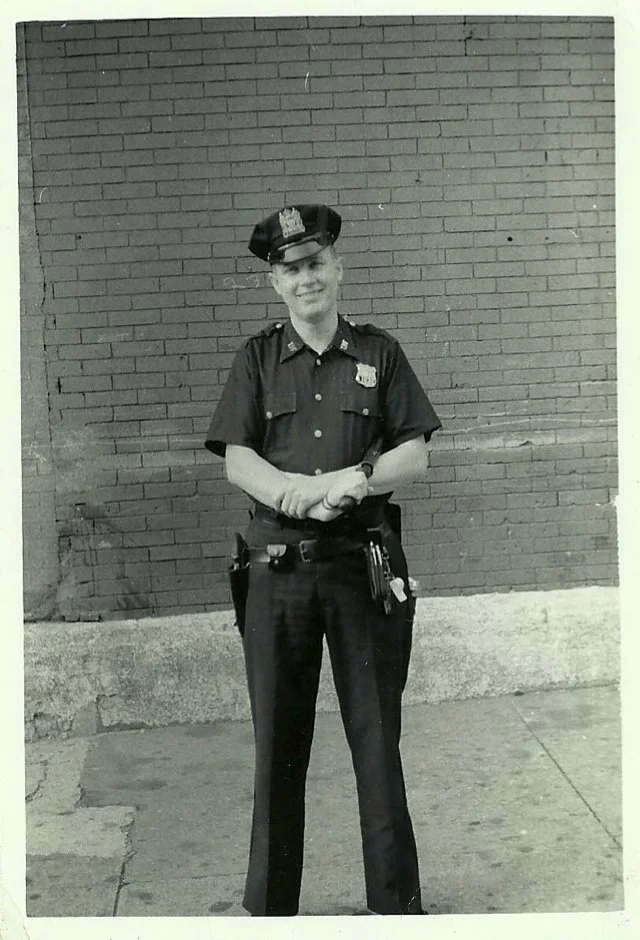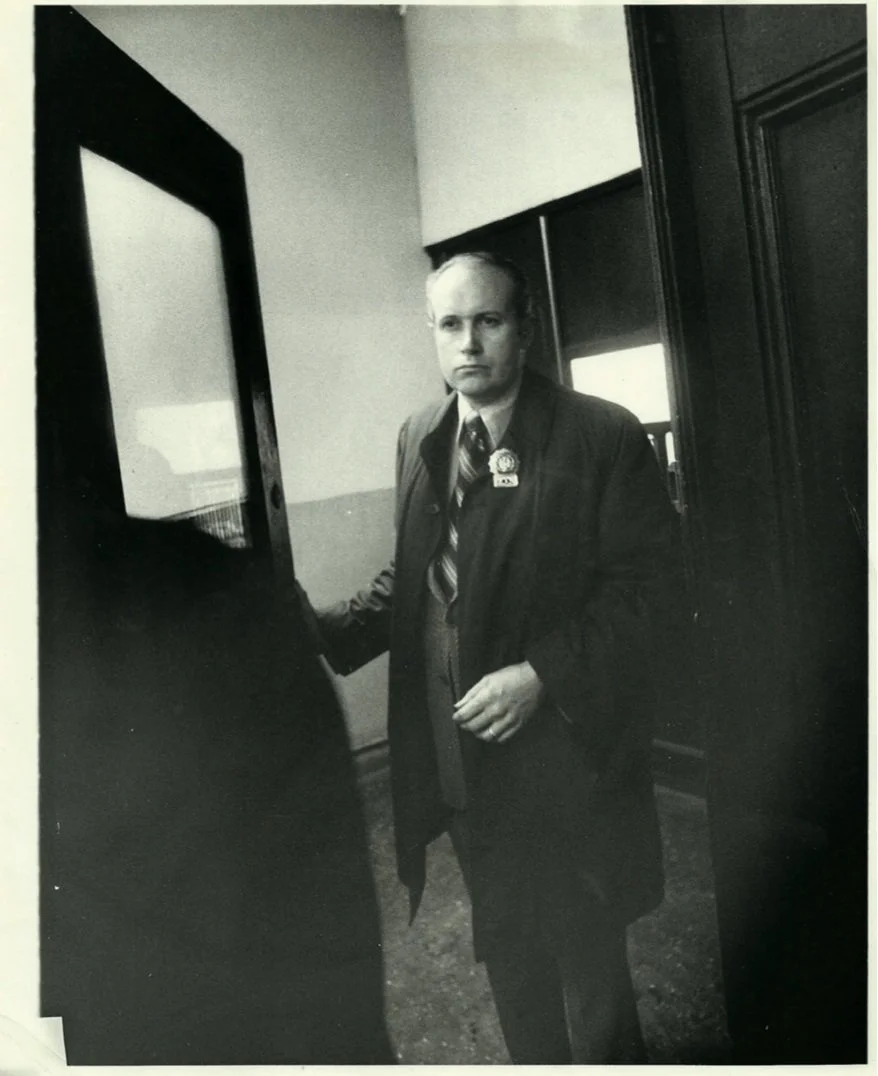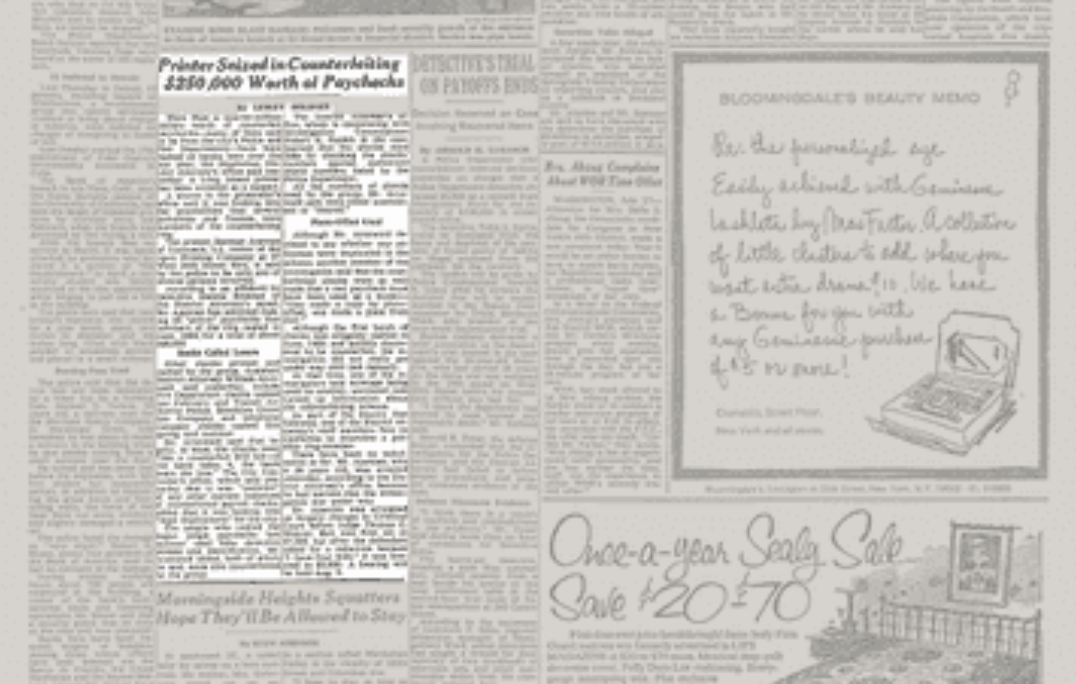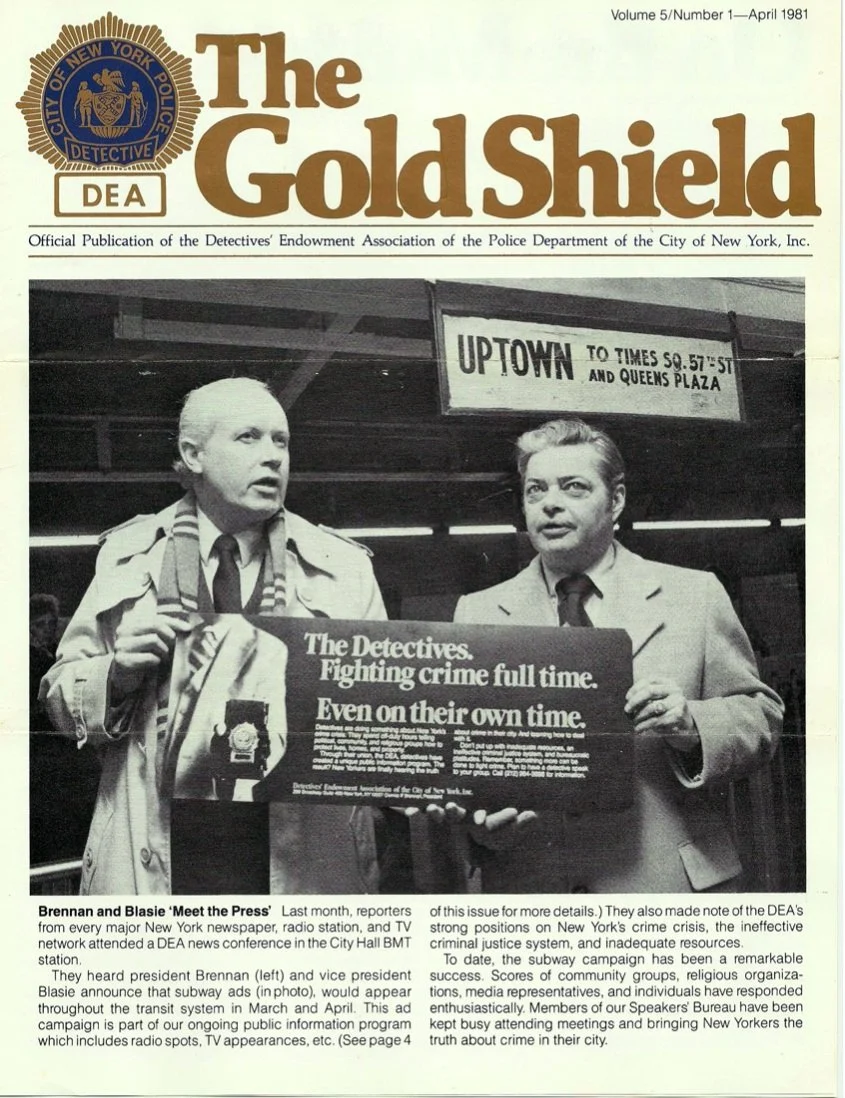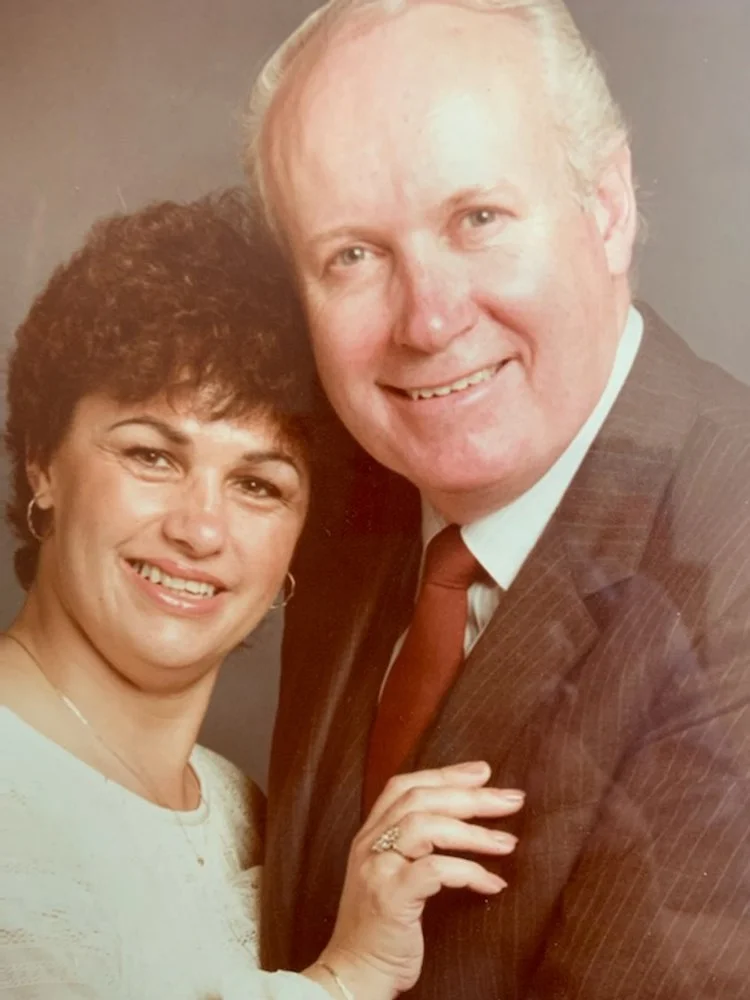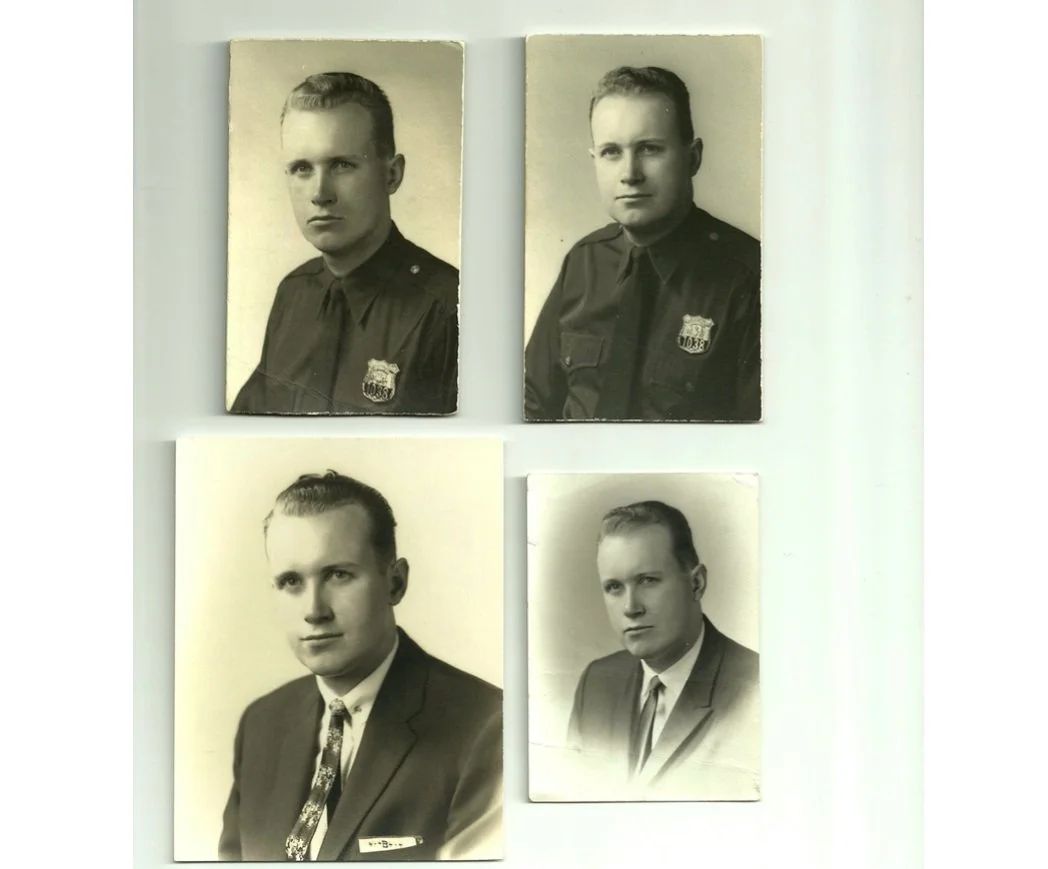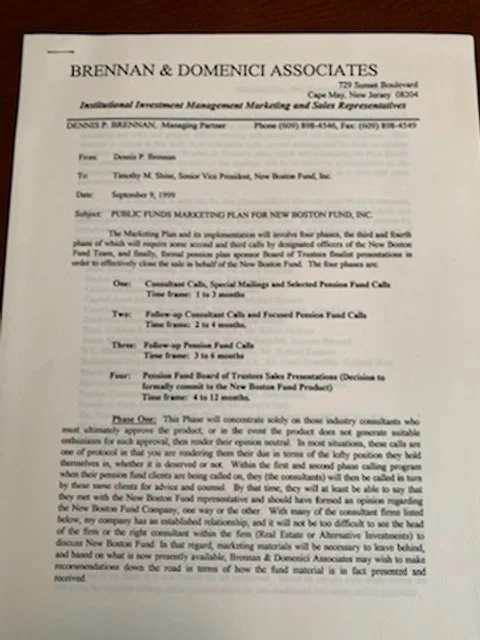
A Contrarian’s Journey
A Personal Memoir by Dennis P. Brennan
A Timeline of Key Dates
Welcome To A Preview Of…
Table of Contents
Dedication & Preface
Dedication
Dedicated to my grandchildren with love and pride,
Maggie, Daniel, Sarah, Kiersten, Sheila Clare, Morgan, Jillian, Aidan, and Brennan,
and to their wonderful parents and uncle, my children, Dennis Patricia, Stephen, Maureen, Sheila, and Kathleen, for the sacrifices they made in making most of this journey possible.
Also dedicated to my wife Anna Marie, her children and grandchildren with love.
Paige, Lindsay, Christina and Joseph, Mark, Jr., and Claire as well as their outstanding parents,
George and Theresa Reeth, and Mark and Laura Reeth
Preview of Preface
This memoir has been especially written for all my grandchildren, and for my children as well. The time period that it covers includes the end of the Great Depression, the Second World War, the Korean War, the Vietnam War, the Cuban Missile Crisis, the Cold War, and the breakup of the Soviet Union.
It was a period when we landed a man on the Moon, and when there were race riots in New York City’s Harlem and Brooklyn, and in Detroit and Philadelphia. And, of course there was President Lyndon Johnson’s Great Society Program which was to end poverty as we know it.
There was the unfair and inexcusable vilification of returning Vietnam War Veterans by many of our citizens, and student demonstrations and sit-ins at our nation’s leading universities. It was also during this period that the drug culture took root, and part of its disciples, the Hippies, formed a subculture youth movement, and held so-called music events in such places as Woodstock, New York.
It was an interesting time to be a witness and participant in the turmoil of the 1960’s and 1970’s, and the time before and after. Of course, during the time you are living through it, you do not reflect upon the historical significance of events as they are unfolding; you just take each day as it comes and do your job, whatever it might be.
A note on the title of the memoir, “A Contrarian’s Journey,” a title that seems to me, fits my career and journey in that, I did not always follow whatever people or organizations thought were the popular or politically smart paths to follow. I always chose a path, contrary at the time, that I felt was not only right for me but right for the organization I happened to be part of at the time. I was never content with the status quo, and that often placed me in some difficulty or trouble, or put my career (whatever it was at the time) at risk, or at the very least, not being overly popular at the moment.
This memoir was written over a period of about eight years, or perhaps a little longer. I hope you, my grandchildren (and children), find the memoir interesting, if not entertaining. Hopefully, you may even find it educational. And in closing, it is hoped that this effort by your grandfather will provide you with a link to your family’s past that in time you will appreciate.
Beaufort County, South Carolina, June 2016
Chapter 1: Growing Up In The Bronx
You need to know where you came from and the history of your family or people in America to appreciate their struggle, what can be accomplished, and to appreciate your own special and unique identity.
Growing up, we always lived in the Bronx, and for most of that time in the Mott Haven section of the Bronx. When I was born, we lived at 602 East 140th Street, just a couple of blocks from where we lived for most of my childhood, at 355 Crimmins Avenue and that was a building on the west side corner of Crimmins Avenue and St. Mary’s Street, which ran parallel to 143rd Street. This was in the South Bronx, and while we did not know it growing up, it was considered a poor neighborhood or a working class neighborhood. It is now classified as the poorest Congressional District in the United States. We, as kids, thought it was a great neighborhood, and that we were far from being poor.
The neighborhood to begin with was a polyglot mix of nationalities; Irish, Italian, English, Jewish, Polish, Russian, German, Puerto Rican, but mostly Irish. The economic depression that hit the United States and the World began in 1929, and lasted for the United States until our entry into the Second World War. My generation is considered depression era babies. I remember people out of work, and men selling apples on street corners to get by.
Chapter 2: The Marine Corps
Enlisting in the Marine Corps was probably the first major decision I made in my life up to that time. Up until the time I graduated from high school, most decisions in my life had been made for me by others or out of circumstances pushing me in one direction or another without having much of a say in the matter; neighborhoods, schools, jobs, and friends. I would have been drafted in the summer of 1953, and would have in all probability wound up in the Army, which would have been all right, but the Army seemed drab to me. The Navy had great appeal, but somehow I did not see myself as a sailor.
I always admired the Marines for their history and reputation and of course their smart uniforms. They were special. I preferred becoming part of the pride and esprit de corps of the Marine Corps with their special relationship with the Navy, and yet operating somewhat like the Army in many respects; the best of both worlds, you might say. I never considered the Air Force. So, I made the important decision, one never to regret, to enlist in the United States Marine Corps in August of 1953. I was the third son of my parents in a row to enlist in the armed forces. Jack had joined the Navy in 1946, and Will had joined the Army Air Force in 1948.
I was sworn in on October 1, 1953, at 250 Broadway, in lower Manhattan, as a private, where along with other New Yorkers from all over the state, city boys and upstate farmers, a motley crew; Catholics, Jews, Blacks, and Protestants. The first time I saw Washington, D.C., and the Capitol was at night as our train pulled into Union Station. We changed trains in Washington, and the following day saw us in Yemassee, South Carolina, where we detrained and boarded buses to the nearby Marine Corps Recruit Depot at Parris Island for basic training.





Chapter 3: The Patrolman Exams and Back to the Bronx
While submitting applications for college, I was then engaged to your grandmother Elizabeth, and I had applied for and received an application for employment as a Patrolman in the New York City Police Department. When I became a civilian again, and married, and while working at Bankers Trust Company as a night teller, I applied again for the next class of patrolmen, took the written test, passed with a high score, took the medical and passed, took the physical (an obstacle course), passed it, and then got through a rigorous background investigation.
You not only needed to pass the test but to score high enough to ensure appointment for the limited number of positions to be filled. This would be the case for promotion to sergeant, lieutenant and captain. If you were left on the list, your candidacy for patrolman died on the list. In my case, there was a few thousand that took the initial exam, about half failing the written (getting a score below 70), and a large number not scoring high enough to be in the appointment range for the positions available, all the rest falling by the wayside. Aside from everything else, you had to be at least five feet, eight inches tall to be appointed.
I had initially toyed with the idea of working nights and going to Iona College during the day and hopefully getting a degree in four years. Marriage put those plans on hold, so I decided to go to Baruch College (part of City College), which allowed a student to attend classes during the day or night. Your grandmother Elizabeth and I were married on January 19, 1957, at Sacred Heart R.C. Church in the Highbridge section of the Bronx, a nice neighborhood then, only a few blocks from Yankee Stadium.
Chapter 4: The Police Department
I was sworn in as a Probationary Patrolman on November 26, 1957, along with 487 other recruits at Police Headquarters at 240 Centre Street in Lower Manhattan. You had to buy your own revolver, and your choice was either a Colt Official Police, or a Smith & Wesson Military and Police, both four-inch barreled six shot revolvers in .38 Special calibers. My choice was the Colt. You brought it home and left it in its box until you qualified with it. I was assigned to Company 16 consisting of twenty-eight police recruits. There were twenty-four companies in all. There were only two probationary policewomen.
The annual salary for your first year was $4,500 based on a 42 hour work week. After three years on the job the salary rose to just under $6,000 a year. I was only in the Police Academy two weeks when a wildcat (not union authorized) transit strike took place crippling the entire New York City transit system, and our class was ordered to work twelve hour shifts (either day or night).
Your Grandmother Elizabeth was in her ninth month of pregnancy with Dennis, Jr., and lo and behold Dennis, Jr., was born on December 14th, at Central Maternity Hospital on the Grand Concourse in the Bronx while I still had to report for duty that night for my twelve hour shift at NYC Transit Headquarters. I sailed through the Police Academy and my Marine background had everything to do with it. Those recruits in our class who did not have any military training did not fare as well, both in the physical training or in the discipline aspect.
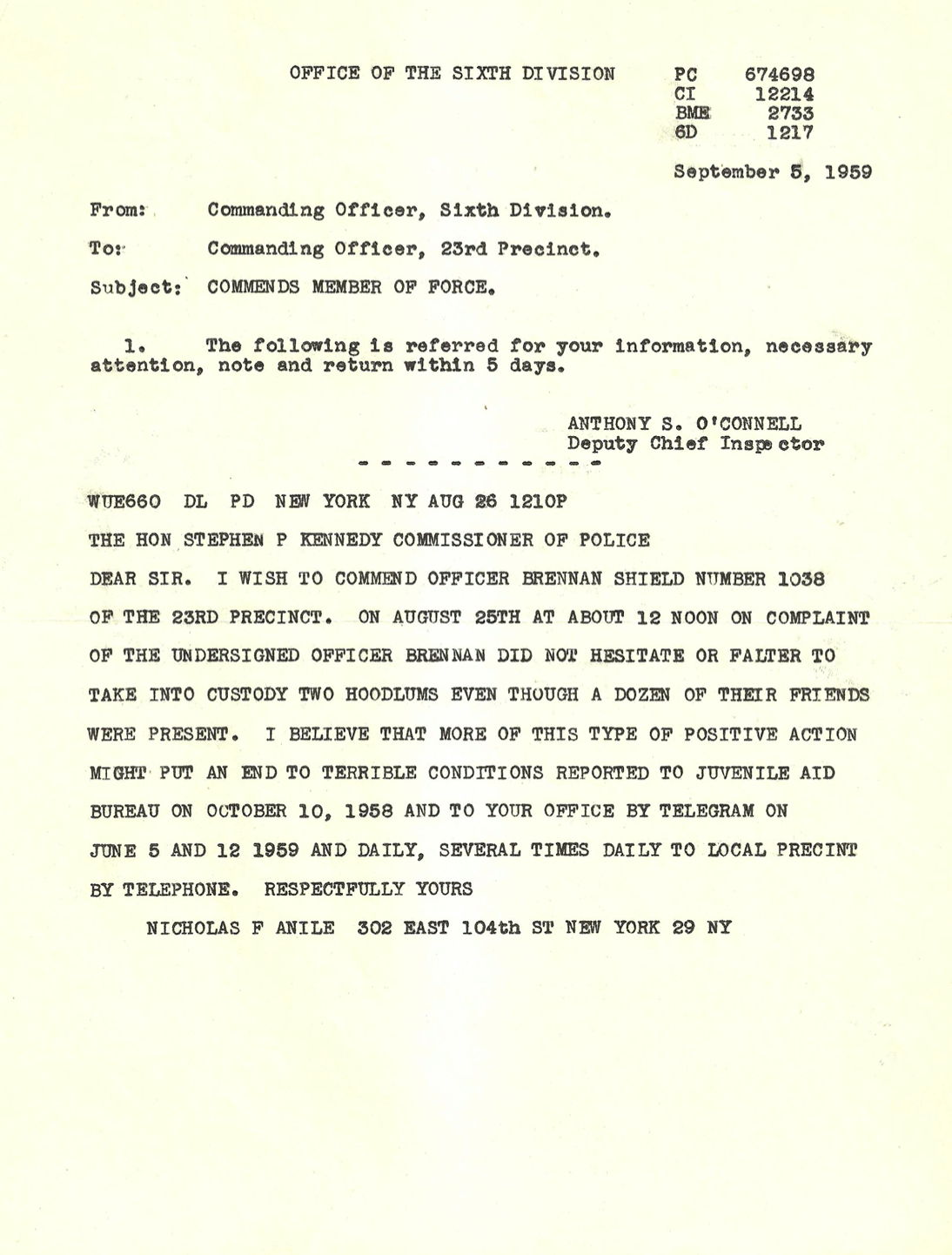



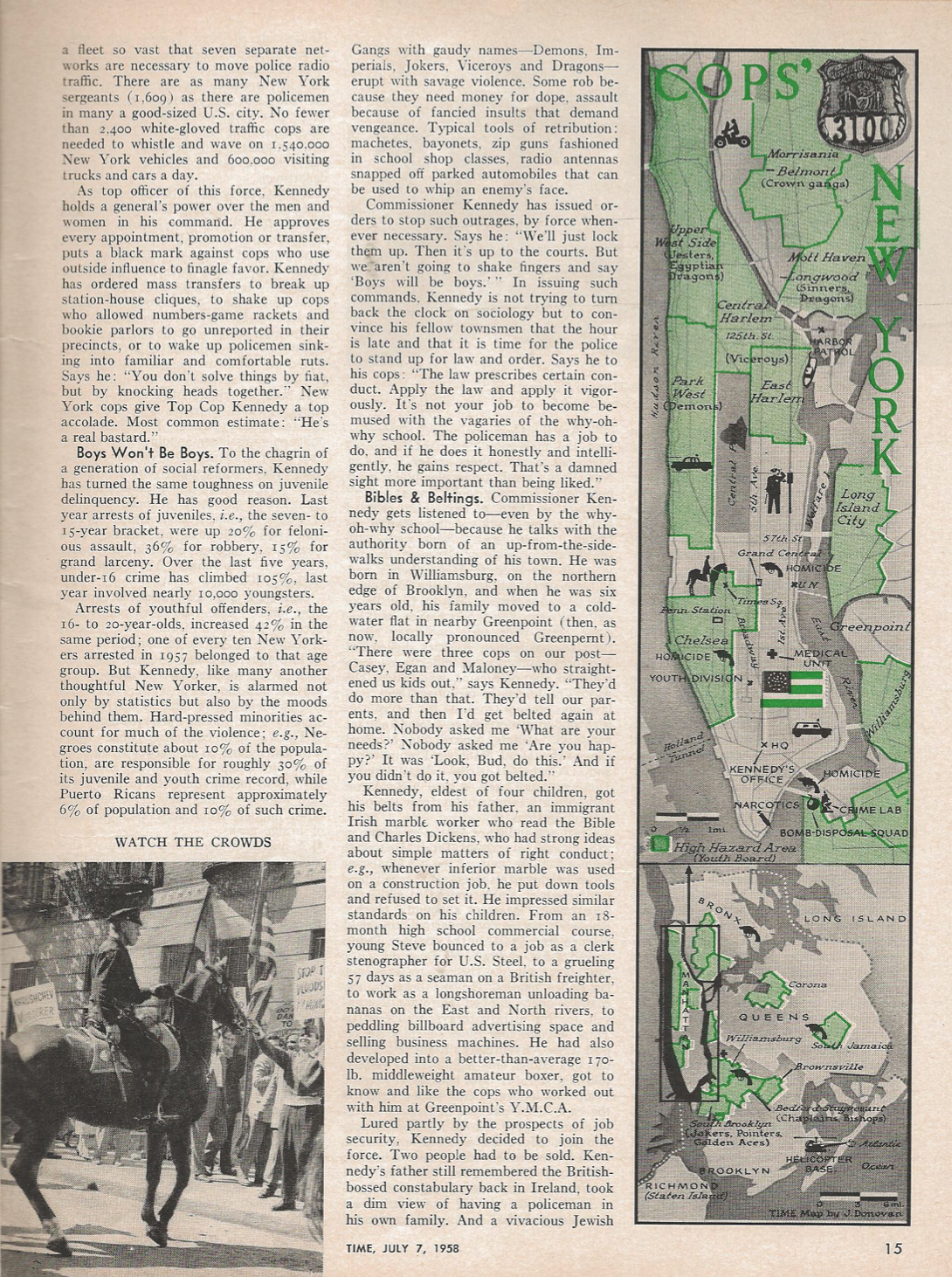

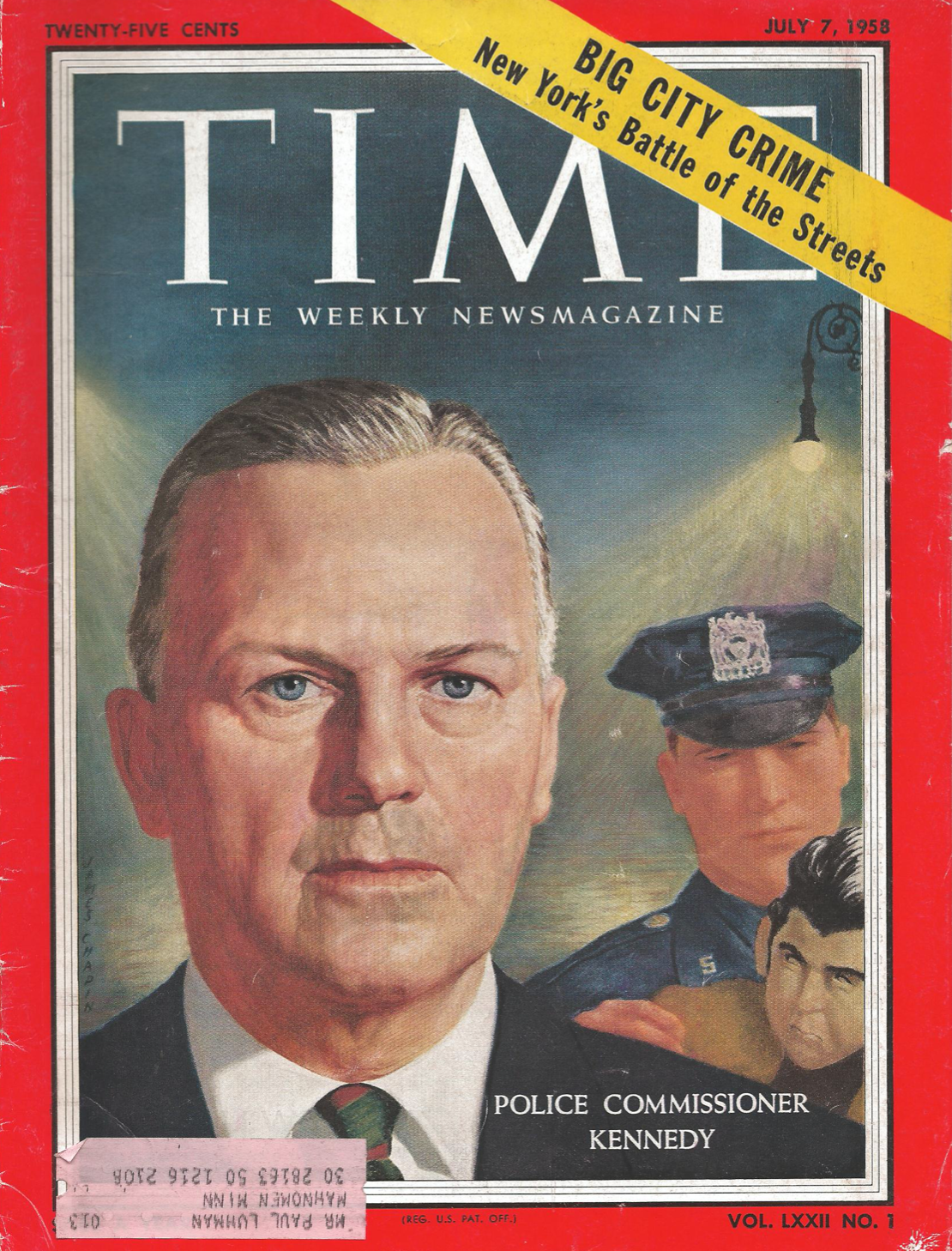

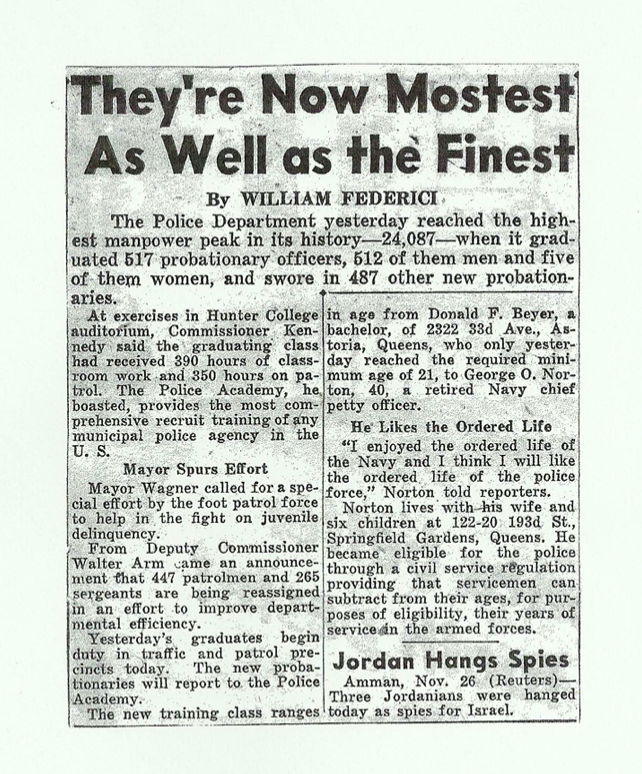
Chapter 5: The Detectives Division
The Central Office Bureau and Squads (COBS) was made up of the city-wide detective squads such as Safe, Loft and Truck Squad (now Major Case Squad); Pickpocket and Confidence Squad; Bureau of Criminal Identification, where criminal and fingerprint records were processed and kept; the Bureau of Special Services (which provided security for our president and visiting heads of state); the Narcotics bureau; the Central Investigation Bureau (organized crime intelligence unit); and the various county district attorney squads. COBS also controlled the various youth patrol units (youth squads). All of the youth squads were manned by white shield detectives, that is, those patrolmen who are in the Detective Bureau but working with their regular patrolman’s shield and patrolman’s pay.
I was assigned to the Manhattan South Youth Patrol unit. There were about 24 of us in the squad reporting to two sergeants and a lieutenant, and we only worked two sets of tours; days (8 to 4) and nights (4 to 12). The Youth Division headquarters was located in a converted old school building on 13th Street just off Sixth Avenue in Greenwich village in lower manhattan. Youth gangs and juvenile delinquency in general were getting a lot of press in those days, and the Mayor and the Police Commissioner created a special division within the department to deal with it.
I was assigned to Zone Three, which took in all of Times square, the Theater District, the Garment District, Hell’s Kitchen, the entire West Side of Manhattan, South of 66th Street, to 14th Street, including the Port Authority Bus Terminal, and all of the jazz clubs and gin joints off Sixth Avenue including the Peppermint Lounge, and other night clubs run by the mob under mob boss Matthew (Matty the Horse) Ianniello.
Chapter 6: The Detectives Endowment Association
The Detectives’ Endowment Association was originally founded to provide a benefit or endowment for a detective’s widow or family if he was killed in the line of duty, or to provide an endowment (a small one time amount of money in cash) to the detective when he retired. The Detectives’ Endowment Association was the first New York City police line organization to become a police union and be granted a collective bargaining certificate, and that was in 1964. The police department’s management could never get used to having to deal with the subordinate ranks over a bargaining table, and continually referred to the various unions as “line organizations.” Be that as it may, the police department was forced to sit down with each of the unions along with the city over the bargaining table.
I was asked to run for Vice President of the DEA, and we called ourselves The Ideal Party (the letters DEA are in middle of the word ideal). We ran a very effective campaign citing the disparity in pay and health and welfare benefits between patrolmen and detectives and the lack of overtime pay and the continued widespread practice of demoting or flopping detectives without due process.
In the Fall of 1978, I took over the reigns of the DEA as President.



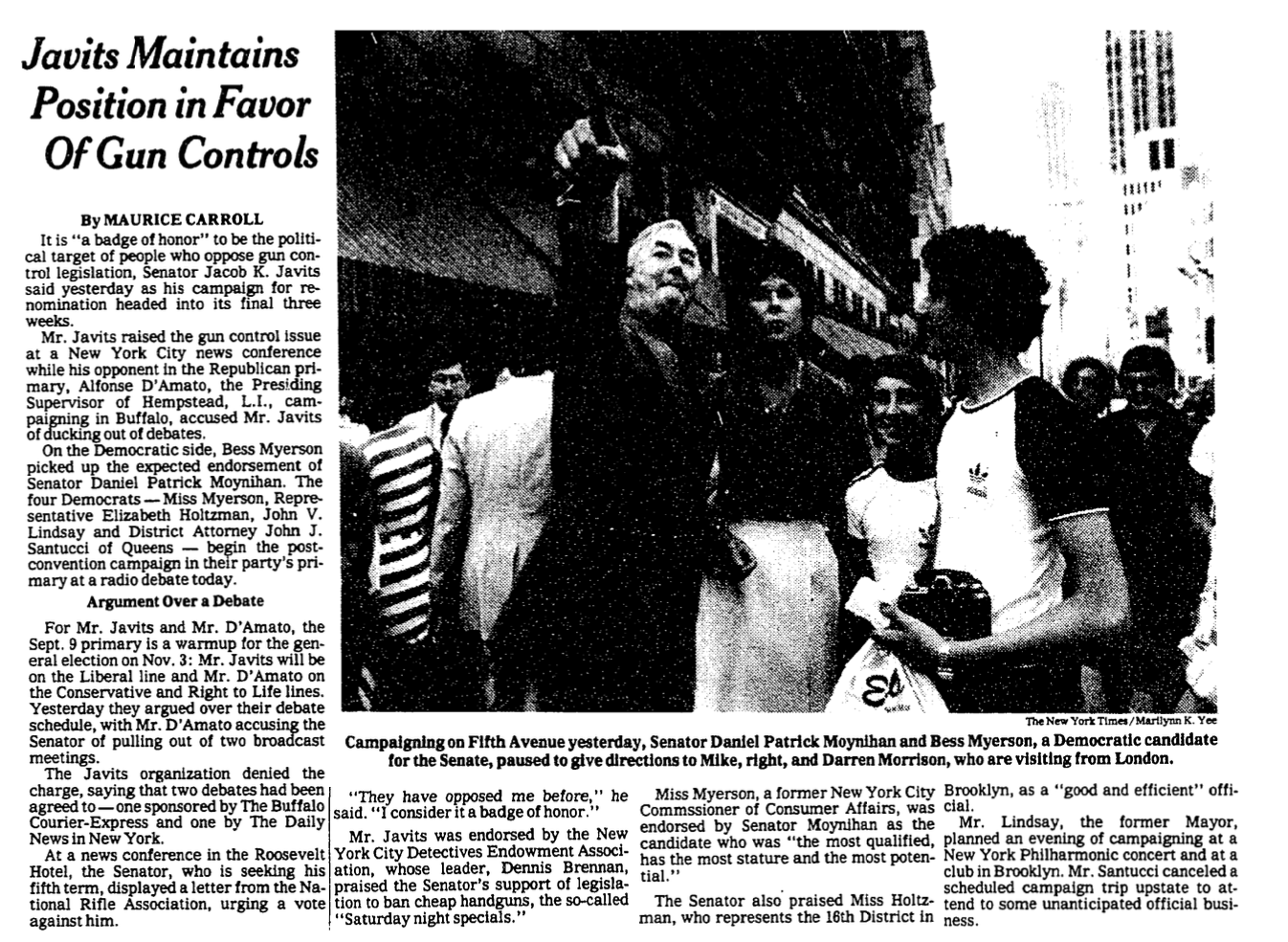


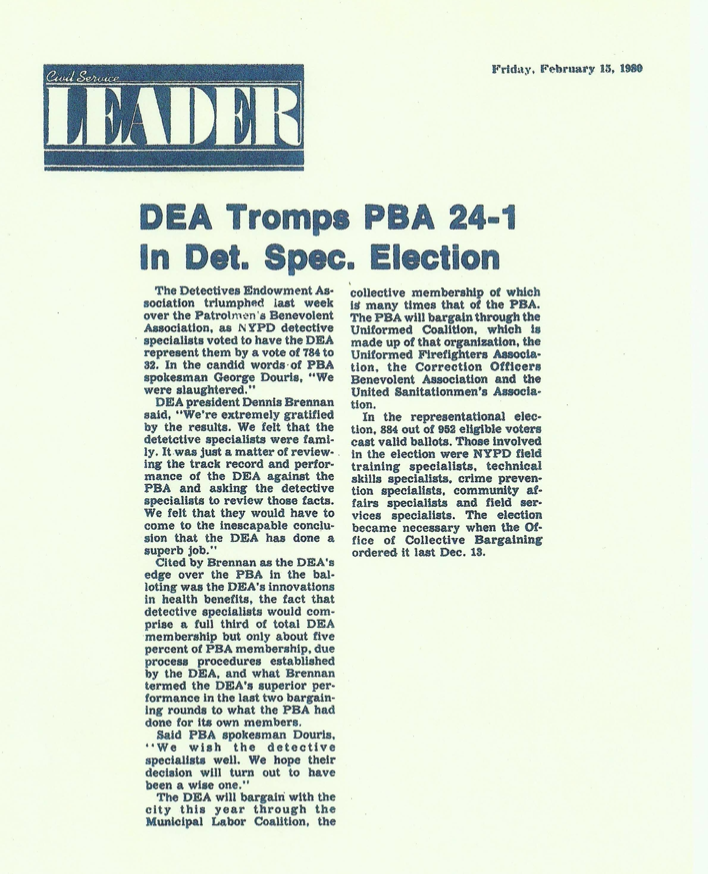

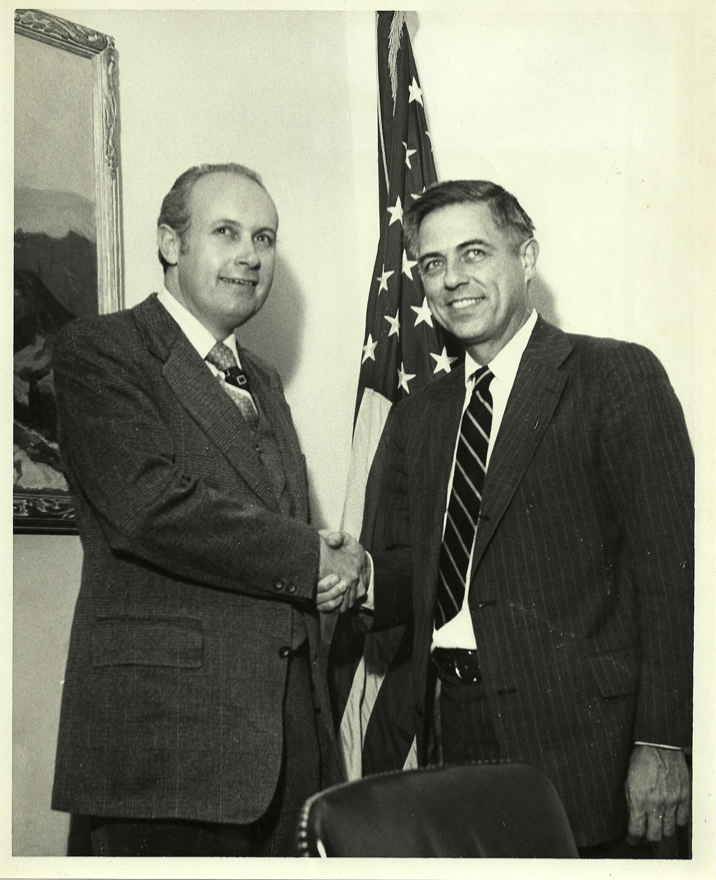
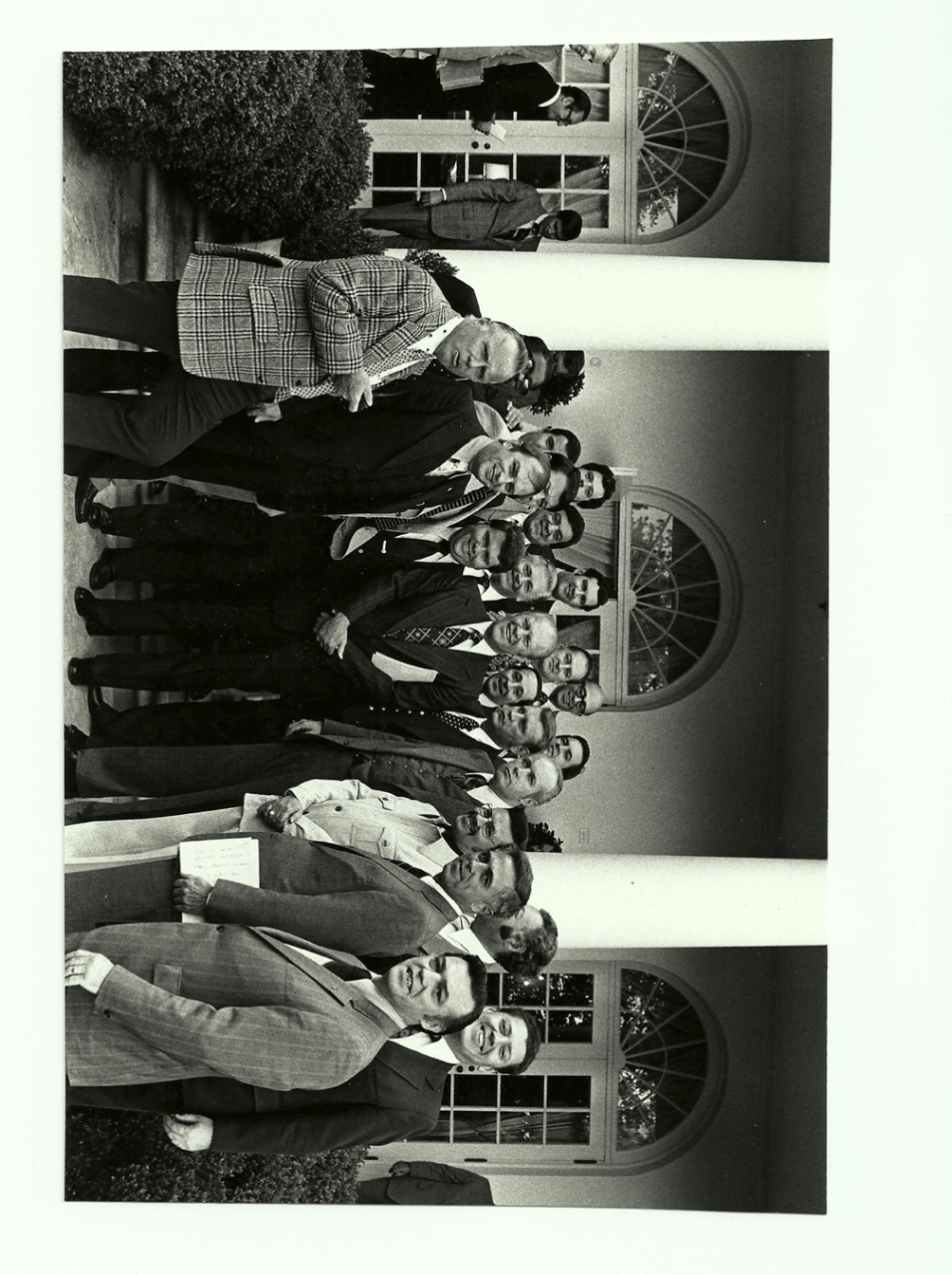


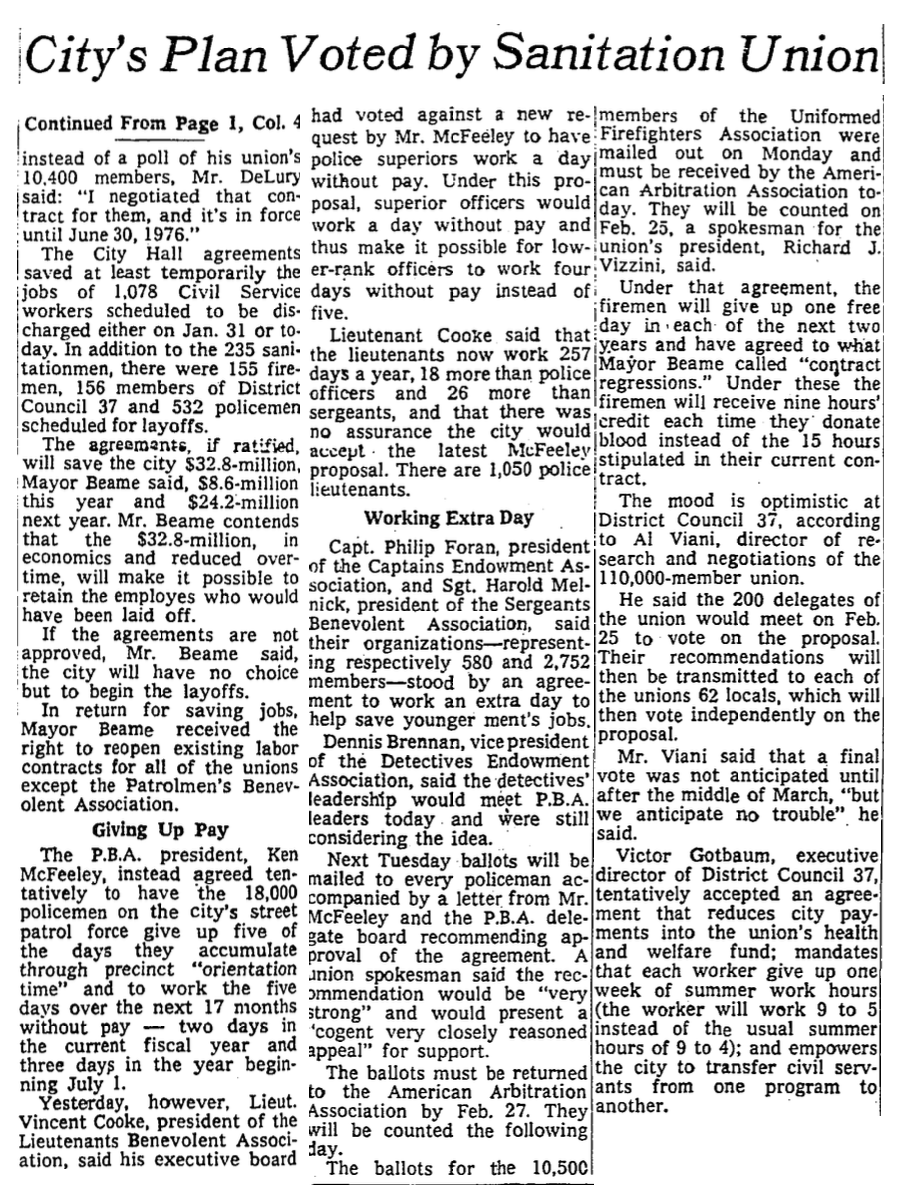


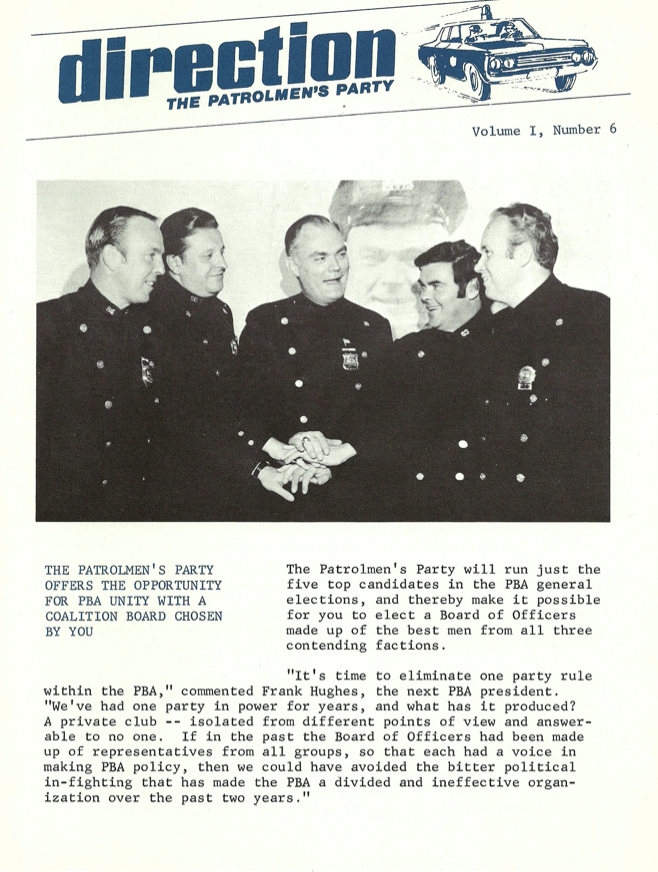

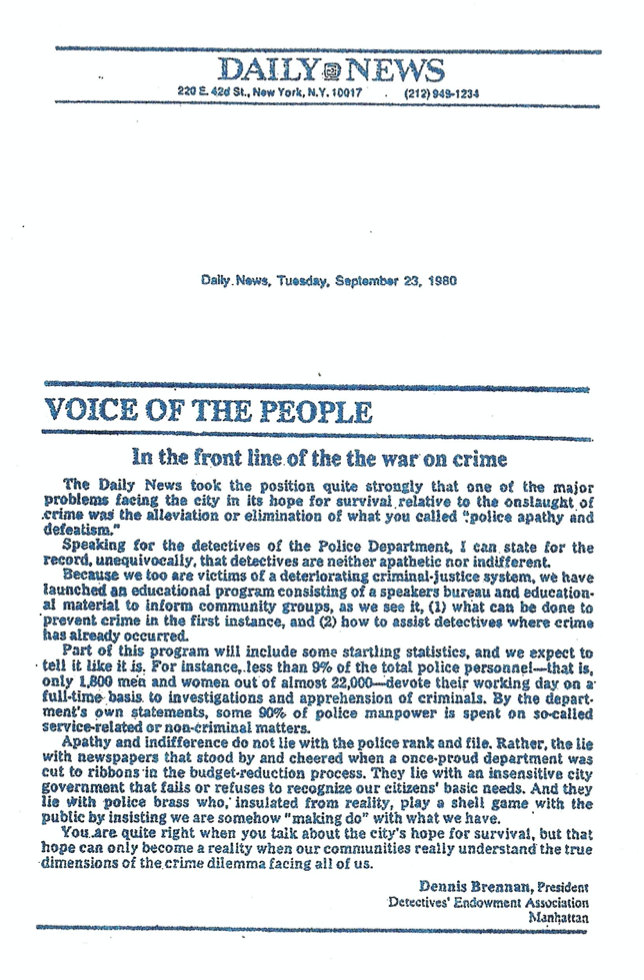
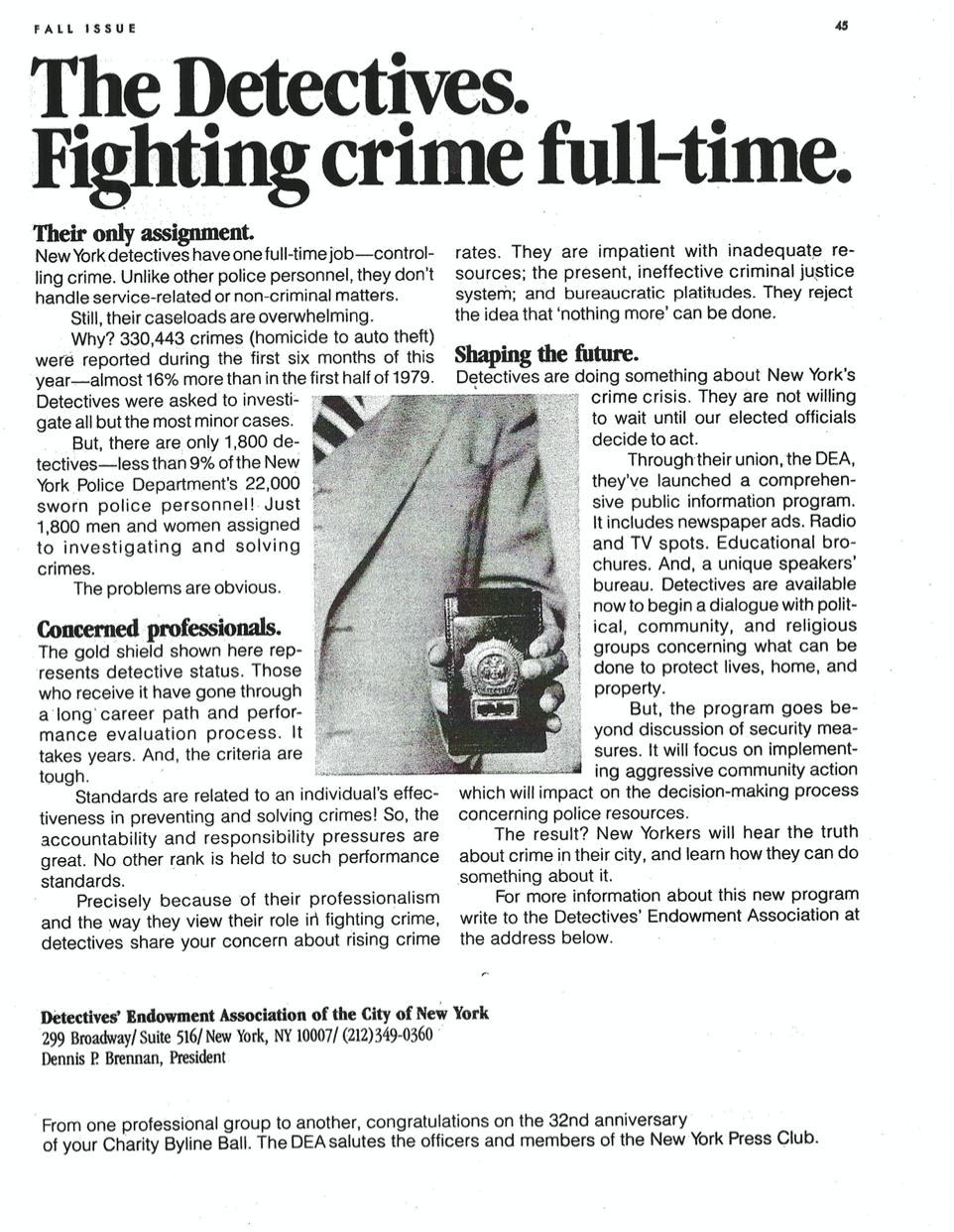



Chapter 7: Changing Careers
For many years I thought of doing something else completely different from police or security work, and of some day owning my own business, or perhaps getting into politics. I also thought of going to law school, as a prerequisite to a political career. With my college degree, background and experience I felt I could change careers, and do something entirely different. I also felt that I wanted to work in the private sector to see if I could be successful there.
I began to put out feelers to different firms the DEA interacted with, and one was Bankers Trust Company who we had hired to handle all the DEA Annuity Fund record keeping and act as Master Custodian for the fund. As it turned out, Bankers Trust Company was looking to expand its Taft-Hartley (union) pension presence as part of its Public Funds Group in the bank’s Employee Benefits Division. They had two marketing and sales people and wanted to add a third. An interview was arranged with the head of the Public Funds Group, and then a second interview with his and the division’s boss, a senior vice president. Both men wanted to know what I knew about selling, and I told them: Everything, since I had to sell my membership (and board) on a daily basis, on what a great job I was doing for them, and also had to sell the city and the police department on the reasonableness of the DEA’s demands.
I was hired as a full vice president, a fairly senior position in the bank. My father, had he lived, would have been flabbergasted and proud to have seen a son of his become a full vice president in a bank that he had worked in for forty years as an elevator operator.
Chapter 8: Brennan and Domenici Associates
After about two and a half years, I decided along with your Grandmother Ann to start our own company, Dennis P. Brennan Associates in April of 1989, which later became Brennan & Domenici Associates, Inc. Our firm was a third party marketing firm representing various companies that offered financial services to pension plans; corporate, public employee, and union plans. Our retainer clients included MetLife, Coldwell Banker Real Estate, and any number of well-known investment management firms; from international investment services firms to large insurance companies.
All of my contacts from my days at Bankers Trust Company, Murphy and Walsh, and from my annual Police Conferences allowed me to call on state, county and municipal (and some corporate plans such as JC Penny, Pfizer, and General Motors) pension plans throughout the United States, including Minnesota and Wisconsin as well as California, Colorado, Massachusetts, Michigan, Texas, Ohio, New York, Illinois, Nebraska, Louisiana, and Missouri, to name a few.
I was the first former police union president to set up his own financial services firm, and it was years afterward before anyone else followed suit. At various public employee conferences, your Grandmother Ann and I would do a lot of entertaining in terms of dinners, lunches, and local trips. What made it possible to form our own company at this juncture, was quite frankly, technology. I had embraced personal computers from the earliest days, and with my typing and writing skills, and with Ann’s knowledge of computer technology and data bases from her working days at the A.C. Nielsen television ratings company, we could set up our office and work anywhere in the country, and in this case, it was out of our home in Hillsdale, New York.
Chapter 9: Lessons & Conclusion
The one important lesson I hope this book imparts is that you can’t wait for something to happen to make something of your life. You literally have to seize an opportunity when it presents itself. If you don’t apply for a particular position, or interview, college, job, grant, or promotion, one thing is certain, you will not get whatever opportunity you are looking for, for in not going after what you want, you already have said no to the chance of getting it. Never listen to the naysayers regarding the chance of getting a particular job or promotion or a career opportunity, or even political office.
There will always be people who will say, “You will never get that job, or that promotion,”or “you will never get into that college,” or “you will never be a good writer and write that novel,” or “you will never get that part as an actor or actress.” Learn to listen to your heart and not be swayed by other people’s opinions; they are generally wrong. Do not be afraid to dream, and do not be afraid to fail. Failing is part of life, and in failing in one thing we are oftentimes a success in others. Not trying to achieve what you want to achieve is the greatest failure of all.
Beware of false prophets or in other words, don’t take what some people say at face value. They are often third person accounts and usually not factual, or they are stating something which they would like you to assume is factual, perhaps in order for you to not to attempt to do something, whatever it might be, for whatever reason. What passes for collective wisdom is often not very wise at all.
Chapter 10: America
God Bless America. It is truly the greatest and most generous nation in the world, and that is something that should never be forgotten. Is it perfect? No, but no other country in the world comes even close to being as good as the United States. When you will be traveling outside of our country and visiting other nations and you will, don’t ever apologize for being an American.
You should be proud of your country and proud to be an American, and I am sure you are. Pride however, does not mean arrogance or being boastful; it means that, in your heart, you know the sacrifices made by the men and women in our armed forces and the strength and courage of our founding fathers; the meaning of the Constitution of the United States and the Declaration of Independence. A nation that has produced the likes of a George Washington, a John Adams, a Thomas Jefferson, a James Madison, an Abraham Lincoln, a Teddy Roosevelt, a John Kennedy, and a Ronald Reagan, to name just a few.
As each of us as individuals are not perfect, neither is the United States, but it is as close to perfect as any nation can be; the freedoms we enjoy protected by the Constitution and the Bill of Rights, along with our form of government (both federal and state) and the ability and opportunity to be what you want to be do not exist in other countries, even those countries that are democratic and free. Our country is not like any other country in the world; it is truly exceptional.
Chapter 11: My Politics
As you have guessed by now I am an unabashed Republican and Conservative, although you might say a liberal conservative. You may wonder why, since my parents are Irish immigrants and most Irish-American Catholics are (or were) Democrats. Although, my sister Margaret would deny it, my father was a Republican, while my mother was a Democrat.
I grew up in the era of Franklin Roosevelt and the New Deal, hallmarks of liberalism in this country, and many would argue that his New Deal policies got us out of the depression. In my opinion, the Second World War got us out of the depression, but that is an argument for others to consider. New York City is a bastion of liberal thought and Democratic politics, and what I witnessed in the late forties and early fifties throughout the sixties and seventies convinced me that the Democratic Party failed the middle and working class by espousing liberal views and policies.
What has prevailed in New York City has been repeated in every major city in the nation, particular those cities run by Democratic administrations. Unfortunately for our country, the national Democratic Party over the last forty years or so has been high jacked by the left-wing of the party and no longer represents the aspirations and values of everyday working Americans.
Chapter 12: The Church
Before I finally wrap this up, I would like to say something about the Roman Catholic Church. While I have not been a very good Catholic, and had fallen away for a period, I never lost my love for the church in America. The institution has been rocked of late by some of the actions by a small minority of the clergy, but overall, the dedication of the priests and nuns over the generations in this country helped immeasurably the plight of the Catholic immigrant, whatever his or her nationality. The church’s building of churches, schools, hospitals and colleges and the work of the various orders of nuns, (as well as the missionaries) in their unselfish dedication to teaching and nursing has always inspired and humbled me. They deserve our unending thanks and prayers for their tireless and compassionate work.















